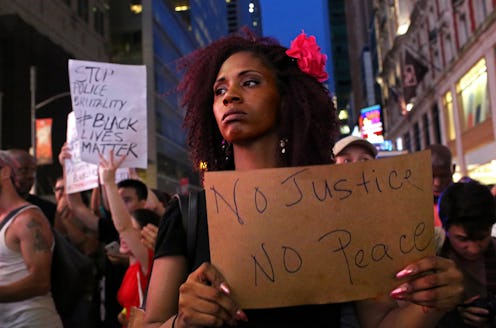Police officers in the United States have murdered at least 123 black people in 2016, according to the Washington Post's "Fatal Force" database, including Alton Sterling and Philando Castile. Lots of people are angry — and this response should not be shamed. People are angry because our political and social systems are built on enslavement and genocide. People are angry because black people are killed by police and the officers responsible rarely face consequences, even when there is video evidence available. People are angry because protests for racial justice are frequently derailed by claims of "inconvenience." This is not the time to diminish, devalue, or dismiss anger.
If you feel safe in the presence of police officers, know that you have a privilege many people do not share with you. Moreover, this privilege means that you can and should demand change. The institution of police can historically be traced back to slave patrols who served the wealthy — what we are seeing today is not new, and we should not treat it as such. Dismantling structures of white supremacy that perpetuate anti-blackness and police violence in our communities is an ongoing responsibility. It shouldn't just be something that occasionally arises on social media to capitalize on black trauma.
Pay attention, too, to the double standard often used to dismiss those who are fighting to make black lives matter in a system that never treats them as if they do. In Dallas, five police officers were killed in a sniper attack Thursday evening. The National Rifle Association quickly responded with a statement to honor the officers. The NRA apparently had nothing to say, however, when Castile — a reportedly licensed gun owner — was murdered after letting an officer know that he had a gun, despite existing open carry laws. This proves, once again, that the gun laws even self-declared liberals are fighting for often preserve a racist status quo.
To the people who are furious about the deaths of police officers but not also about the deaths of black people who are murdered by police: That is not "justice." It is appallingly unjust to blame the Black Lives Matter network for what happened in Dallas on Thursday, and doing so also misunderstands why the network is so necessary in the first place. BLM had to release a statement just to make that point:
The Black Lives Matter Network advocates for dignity, justice, and respect.
In the last few days, this country witnessed the recorded murders of Alton Sterling and Philando Castile at the hands of police, the latest victims in this country’s failed policing system. As we have done for decades, we marched and protested to highlight the urgent need to transform policing in America, to call for justice, transparency and accountability, and to demand that Black Lives Matter.
In Dallas, many gathered to do the same, joining in a day of action with friends, family, and co-workers. Their efforts were cut short when a lone gunman targeted and attacked 11 police officers, killing five. This is a tragedy–both for those who have been impacted by yesterday’s attack and for our democracy. ... Black activists have raised the call for an end to violence, not an escalation of it.
I understand that this is an emotionally devastating time. But black people should not have to bear the responsibility of transforming a system that is literally killing them. It is up to us – non-black people, including non-black people of color such as myself — to show up.
This means recognizing that sharing the videos of Sterling's and Castile's deaths is triggering, and serves to consume and dehumanize, rather than make space for, black trauma. This means consistently talking to our friends and families about combating anti-blackness in our communities, not just when something happens. This means understanding that anger is a valid, justified response to what is taking place, and that anger can be a powerful tool in fighting for change. Now is not the time to center our own narratives, but rather to amplify the voices of black people who have had to do this work forever.
Activism is not recreational. People don't block freeways for fun — they do it because their survival is at stake. So if people are angry right now, and they are mourning, affirm that anger, and use your own anger and privilege to fight for some genuine, systemic change. After all, anger is a means of reclaiming space that marginalized people are frequently denied. Make space for the black people in your life right now and always, support alternatives to the militarized police state, and think about how we are all complicit in perpetuating state violence and systemic racism.
